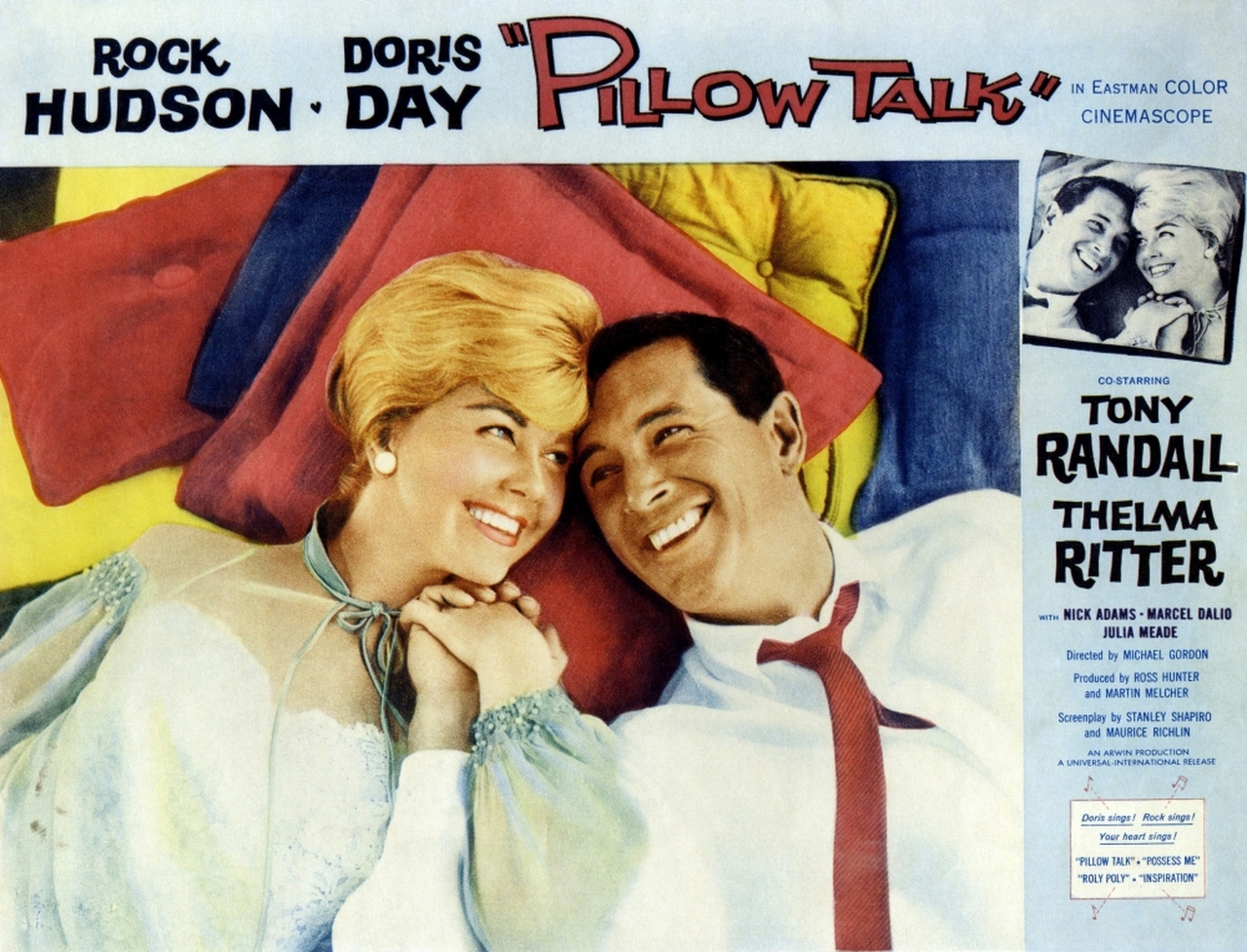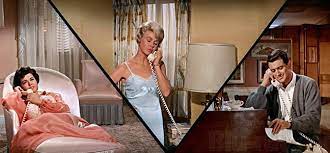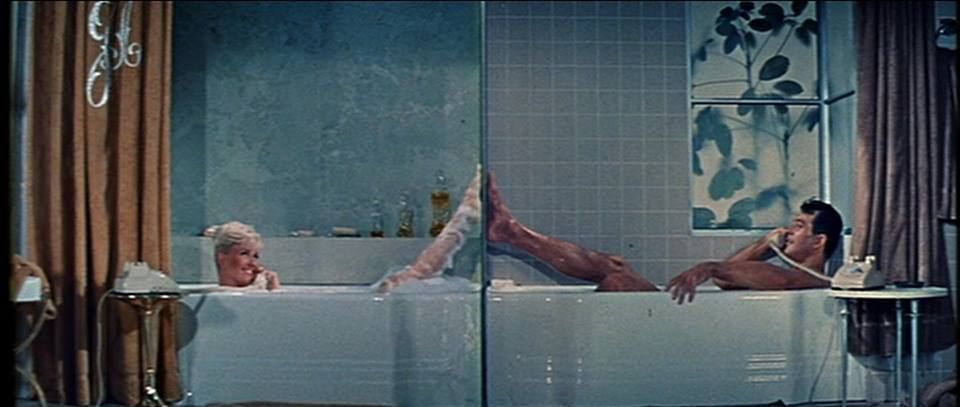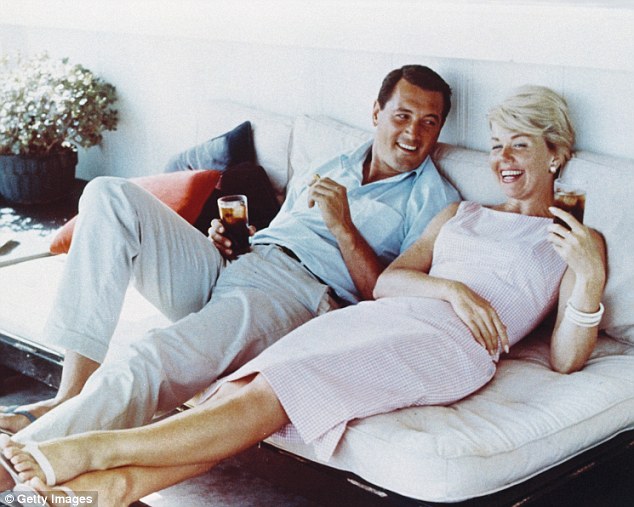Doris Day @ 100: "Pillow Talk"
 Saturday, April 2, 2022 at 9:12PM
Saturday, April 2, 2022 at 9:12PM By Christopher James
 Doris Day had the biggest hit of career with "Pillow Talk," which was her first movie with Rock Hudson
Doris Day had the biggest hit of career with "Pillow Talk," which was her first movie with Rock Hudson
Doris Day’s sole Oscar nomination came for Pillow Talk. If this isn’t the best performance of her career, it’s at least the most iconic version of her persona. For those looking to get a sense of her star character, this is the best place to start. Pillow Talk was the highest grossing movie of Day’s career, and the start of her most bankable period. According to the Numbers, Pillow Talk was the fifth highest grossing film of 1959 with $18 million box office (roughly $182 million adjusted for inflation). In addition to acting, Day also sings three songs in the film, most notably the titular song that plays over the delightful opening credits.
It’s impossible to resist the pairing of Rock Hudson and Doris Day in Pillow Talk. While Down with Love most infamously used this film for reference, so many modern romantic comedies and sitcoms mine from Pillow Talk, which effectively wrings laughs from miscommunications, mistaken identities and odd couple dynamics...
 In one of our first introductions to Day's Jan, she's framed as a cockblock in split screen, disrupting the party line she's on with Hudson's Brad.The romantic comedy casts Doris Day as Jan Morrow, a successful, single New York interior designer who cannot stand the man who shares the party line in her building. His name is Brad Allen (Rock Hudson), a playboy musician who constantly ties up the phone line talking to women he has slept with. Try as she might, Jan cannot get rid of Brad from the party line. One night while they are both out on the town, Brad accidentally meets Jan, though Jan does not know who he is, as they have only talked on the phone. Brad pretends to be a wealthy Texan who has just moved to New York, striking up a romance with Jan.
In one of our first introductions to Day's Jan, she's framed as a cockblock in split screen, disrupting the party line she's on with Hudson's Brad.The romantic comedy casts Doris Day as Jan Morrow, a successful, single New York interior designer who cannot stand the man who shares the party line in her building. His name is Brad Allen (Rock Hudson), a playboy musician who constantly ties up the phone line talking to women he has slept with. Try as she might, Jan cannot get rid of Brad from the party line. One night while they are both out on the town, Brad accidentally meets Jan, though Jan does not know who he is, as they have only talked on the phone. Brad pretends to be a wealthy Texan who has just moved to New York, striking up a romance with Jan.
While Doris Day has always been a symbol of the virginal ‘50s, re-watching Pillow Talk through the modern lens shows more complexity within her characterization. Jan is a career gal, living happily alone in New York City and running a successful interior design business. She’s not seen as pathetic or depressing. In fact, she’s turning down extravagant gifts and proposals from clients. Twenty-one year olds are trying to get in her pants. Her biggest problem isn’t that she’s single, it’s that she can’t get Brad off her party line. The party line becomes a sexy tug of war between Jan and Brad, where Jan is an equal, formidable foe that can wrestle power from Brad.
Pillow Talk effectively pushes the boundaries of Doris Day’s squeaky clean image with the use of verbal and visual double entendres. No, she never turns herself into a pinup sex goddess. Her characterization of Jan Morrow is still very much of someone buttoned up, prim and proper. However, as she flirts with Brad, her chill thaws in ways that deliver the biggest laughs. According to AFI’s Catalog, “Pillow Talk helped redefine Day’s image into what she described in her autobiography as “a new kind of sex symbol—the woman men wanted to go to bed with, but not until they married her.”” The minute Brad recognizes Jan and hatches his plan, he remarks about her beauty, albeit crudely. “So that’s the other end of your party line,” muses Rock Hudson’s Brad as he stares at Doris Day’s backside.
 It's one thing to have good chemistry in person, it's another to have great chemistry over the phone.The sexiest scene in the film comes when Jan and Brad (as Rex Stetson) talk on the phone while they are both in the tub. The use of split screen makes it look as if they are facing straight at each other, sharing the same tub. They each put one foot up in the same spot on opposite sides of the split screen. It’s an erotic image, as if they are sharing physical intimacy simply over the phone. The close up of their feet feels almost invasive with its pure horniness. Thus, Jan slams her foot down back in the water. She’s shocked by the physical desire she feels simply by Rock Hudson’s bad Texas accent. Who wouldn’t?
It's one thing to have good chemistry in person, it's another to have great chemistry over the phone.The sexiest scene in the film comes when Jan and Brad (as Rex Stetson) talk on the phone while they are both in the tub. The use of split screen makes it look as if they are facing straight at each other, sharing the same tub. They each put one foot up in the same spot on opposite sides of the split screen. It’s an erotic image, as if they are sharing physical intimacy simply over the phone. The close up of their feet feels almost invasive with its pure horniness. Thus, Jan slams her foot down back in the water. She’s shocked by the physical desire she feels simply by Rock Hudson’s bad Texas accent. Who wouldn’t?
Through his Rex Stetson persona, Brad becomes the piece of man candy that Jan has always wanted, but he also gets to be a piece of meat she objectifies. When talking with her housekeeper, an old drunk named Alma (Thelma Ritter, always memorable), Jan says “[Rex is] six-foot-six, handsome, intelligent, owns a mountain.” Okay, we all know what she was sizing up when she said “six-foot-six” and it wasn’t just his height. Rex doesn’t just make her think of marriage, he also turns her on and makes her think of sex. This is what separates Pillow Talk from other romantic comedies and other Doris Day performances. She’s horny for Rex (aka Brad), and so are we.
“Well there are some men who... hmmm how shall I put it? Well they're very fond of their mothers... They like to share bits of gossip... collect recipes.”
Looking back at a movie made in the ‘50s is always a dicey proposition, especially when it comes to comedies. Pillow Talk has both aged well and poorly in different ways. What struck me most were, in hindsight, some of the more meta moments in the script. One sequence involves Brad planting the thought in Jan’s mind that Rex Stetson might be gay. When Jan goes on her next date with Rex, he plays up the qualities Brad defined as gay just to make Jan nervous. Yes, Rock Hudson was not out at the time of the movie. However, it’s interesting to watch a closeted, famous heartthrob “play gay” even for a few moments. Moreso, the joke is on Jan, not on the “possibly gay” Rex. Of course later we then get a bizarre running joke where a doctor and nurse think Brad is a trans man because he mentioned “having a baby” and was in a women’s restroom. Not every joke lands, but there is a kind-hearted raciness to some of Pillow Talk’s jokes. Though Doris Day may be the pure, every-day girl, Pillow Talk casts her as a big city girl, and girls in the big city have to deal with some crudeness every once in a while.
 Rock Hudson and Doris Day remained great friends off screen as well. Their charisma carried forth in two additional projects together.Despite the aforementioned dated elements, it’s almost impossible to resist Doris Day and Rock Hudson’s charms. Even though the final climax involves Brad effectively kidnapping Jan to take her to the horrendous apartment she spite designed for him, the final note of them kissing and professing their love is completely swoon-worthy. Each star’s persona rubs off on the other. Doris Day eases the traditionally dramatic Rock Hudson into the genre of screwball romantic comedy. Meanwhile, Rock Hudson takes Doris Day on a walk on the wild side, giving her characterization a little edge and a whole lot of sexuality. They would work with each other two more times - for Lover Come Back in 1962 and Send Me No Flowers in 1964. Still, their chemistry was never better than in Pillow Talk.
Rock Hudson and Doris Day remained great friends off screen as well. Their charisma carried forth in two additional projects together.Despite the aforementioned dated elements, it’s almost impossible to resist Doris Day and Rock Hudson’s charms. Even though the final climax involves Brad effectively kidnapping Jan to take her to the horrendous apartment she spite designed for him, the final note of them kissing and professing their love is completely swoon-worthy. Each star’s persona rubs off on the other. Doris Day eases the traditionally dramatic Rock Hudson into the genre of screwball romantic comedy. Meanwhile, Rock Hudson takes Doris Day on a walk on the wild side, giving her characterization a little edge and a whole lot of sexuality. They would work with each other two more times - for Lover Come Back in 1962 and Send Me No Flowers in 1964. Still, their chemistry was never better than in Pillow Talk.
What is your favorite Doris Day movie? Help us celebrate Doris Day at 100 in the comments below.



Reader Comments (8)
Doris is completely irresistible in this even if as you say it's not the best performance of her career, that would be her work in Love Me or Leave Me.
It did definitely cause a sea change in her career, up to this point she was always appealing but more the every girl who you could see living next door (if your neighbor could sing like a bird that is) after this she's a high fashion glamour girl.
She worked well with most of her leading men but her chemistry with Rock is so special. She, Tony Randall and Thelma Ritter all sparkle in their interchanges too (and I love Allen Jenkins small role as the elevator operator who pines for Thelma).
A lovely film even with its imperfections.
Doris-Day-Rock-Hudson movies should really be called Doris-Day-Rock-Hudson-Tony-Randall movies.
Can anyone whine as well as Tony Randall when he finds out he is not the perfect match for Doris Day and that Rock Hudson is? Although he was never the lead in these movies, his role was important and memorable.
These movies had wonderful character actors like Randall and Thelma Ritter.
Thank heaven for modern televisions! For years I watched this on a square TV and all of the widescreen charm was lost due to the awful pan and scan. Seeing Doris put up her foot in the bathtub, and then moving to the next "scene" where Rock does the same, just doesn't quite work. And don't get me started on black and white TVs.
Getting Doris out of those godawful petticoats and into form fitting dresses was the best thing that ever happened to her career. All of a sudden, people realized how sexy (and slightly butch) Doris could be. Has anyone ever become a big star this late in their career? And it must be said, this "old" (in Hollywood years) as a female star?
And I've always thought that it was Doris' movies that were virginal, not Doris' characters particularly. Sure she always played a "good girl," but the sexual energy was roiling just underneath.
If "REX STETSON" isn't the perfect soap opera name I don't know what is! lol
“Has anyone ever become a big star this late in their career? And it must be said, this "old" (in Hollywood years) as a female star?”
Day first hit the top ten money making movie star poll in 1951 at age 39, the same age as Harrison Ford when he debuted in 1981. Marie Dressler, who made her film debut at age 46, topped the poll at age 64.
I don't know that I'd say that Doris "became" a big star with Pillow Talk as much as a superstar. From her first picture 1948's "Romance on the High Seas" she was a success and was Warner Brothers top musical star until she departed there in 1955 and was sought after following that but the monster success of this film definitely put her at a new level.
Finbar -
Check your math. Doris Day would only have been 29 in 1951.
Her chemistry with Hudson is wonderful. They had a great friendship after filming. Once, Hudson was a guest on the Doris Day Show and she asked what his favorite movie he made was and he jokingly responded, "Ice Station Zebra" before saying "Pillow Talk"
I watched this movie for the first time just a year ago and never thought of Day as virginal in the movie. She seemed almost like a prototype Sex and the City gal- single, working, fabulous, and trying to make it all work. I got the sense that Jan had already had sex with other men before the events of the movie started and that she didn't feel shamed about it.